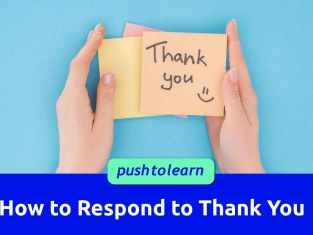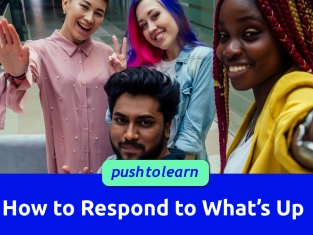by PushtoLearn
How to Respond to How are You
Table of Contents
Common Responses to "How Are You?"
Here are 10 simple and polite responses you can use:
|
Response |
When to Use It |
Tip |
|
I'm good, thank you. |
Neutral and polite for any situation. |
Use this in formal or informal settings for a safe and polite answer. |
|
I'm fine, and you? |
Polite, especially in formal situations. |
Add "and you?" to show interest in the other person. |
|
I'm doing well, thanks. |
Professional or formal setting. |
Perfect for workplace conversations or business meetings. |
|
Not too bad, thanks. |
Casual and friendly tone. |
Use this when chatting with friends, colleagues, or acquaintances. |
|
Pretty good, thanks! |
Informal but positive. |
Great for casual settings with friends or peers. |
|
I've been better. |
When you're not feeling great but don't want to explain. |
Use this when you want to be honest but keep it brief. |
|
I'm okay, how about you? |
Casual and neutral. |
Use when you’re not feeling strongly one way or the other. |
|
Great, thanks for asking! |
Enthusiastic response for friends or work. |
Perfect when you want to sound upbeat and positive. |
|
I'm a bit tired, but okay. |
Honest but polite. |
Ideal for close friends or family when you want to share a little more. |
|
Just hanging in there. |
Casual, shows you're dealing with a challenge. |
Use this with people you know well, like close friends or family. |
How to Respond to How are You Exercises
These exercises focus on How to Respond to How are You

Rules for Responding
-
Match the tone: If the person sounds formal, use formal language. If they’re casual, you can be more relaxed.
-
Add “thank you”: This makes your response polite.
-
Ask them back: Saying “And you?” or “How about you?” keeps the conversation balanced.
Common Errors to Avoid
-
Over-sharing personal details: Keep it short unless you’re talking to a close friend.
-
❌ "I’m terrible because I failed my exam, my cat is sick, and my phone broke."
-
✅ "I’ve been better, thanks for asking."
-
Using the wrong tone: Be polite in professional settings.
-
❌ "What’s it to you?" (Rude)
-
✅ "I’m doing well, thanks."
-
Not responding at all: It’s important to answer, even briefly.
Everyday Use
Let’s see some examples in real-life situations:
Example 1: Formal
Boss: How are you?
You: I’m doing well, thank you. And you?
Example 2: Friendly
Friend: How are you?
You: Pretty good, thanks! How about you?
Example 3: Honest
Family member: How are you?
You: A bit tired, but okay.
FAQs
1. What does "How are you?" really mean?
It’s a polite way to start a conversation, not always a deep question.
2. Do I need to give a truthful answer?
Not always. In casual conversations, a short and polite answer is enough.
3. How do I reply if I’m not okay?
You can say something like, “I’ve been better,” or “I’m okay, just a bit tired.”
4. Is it okay to just say “Good”?
Yes, but adding “Thank you” sounds more polite: “I’m good, thank you.”
5. Should I always ask “And you?” back?
Yes, it’s polite and keeps the conversation friendly.

